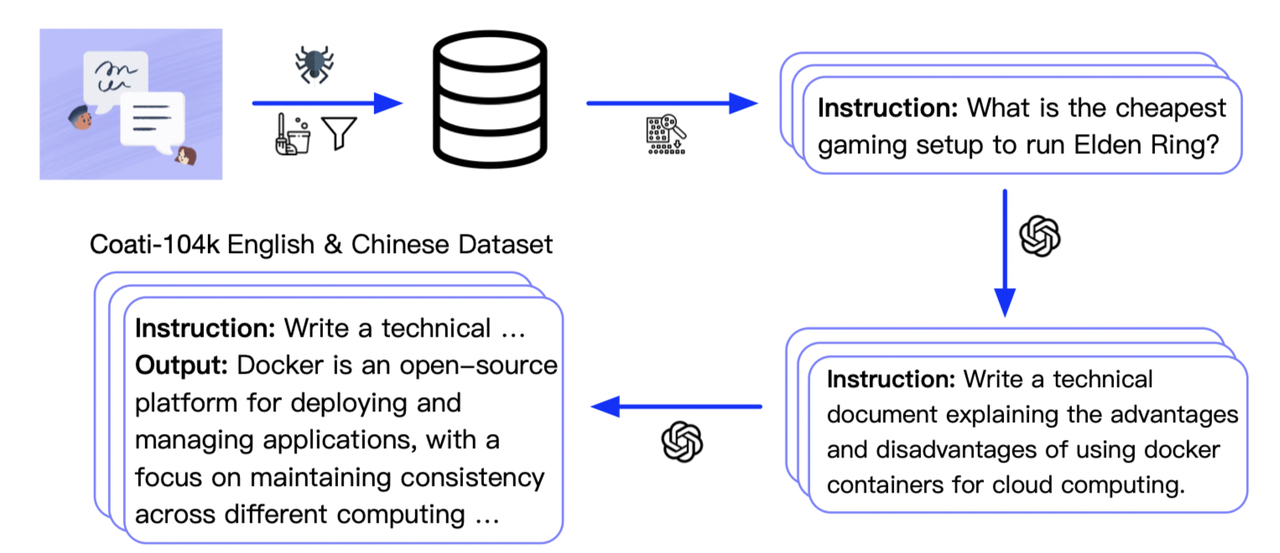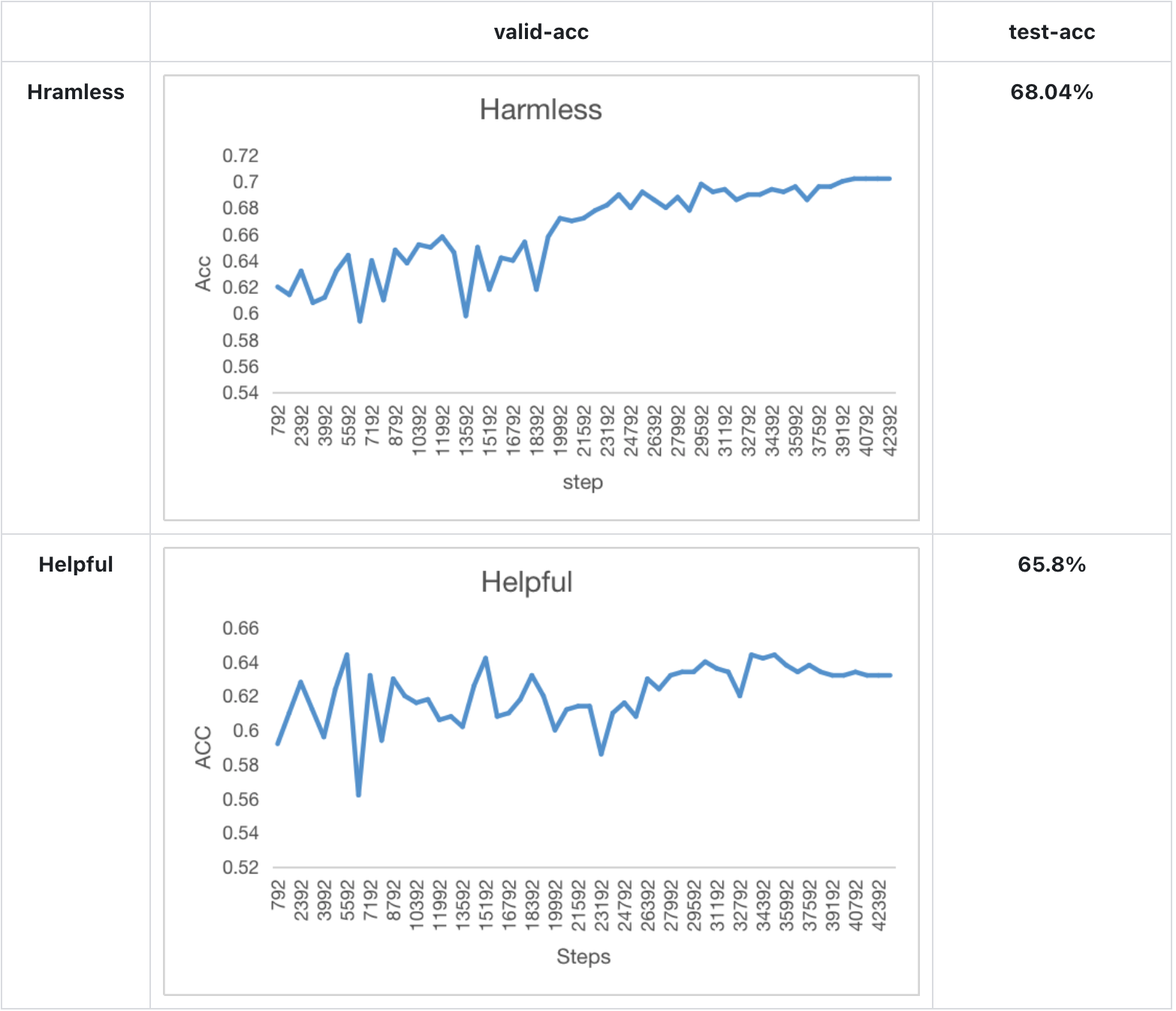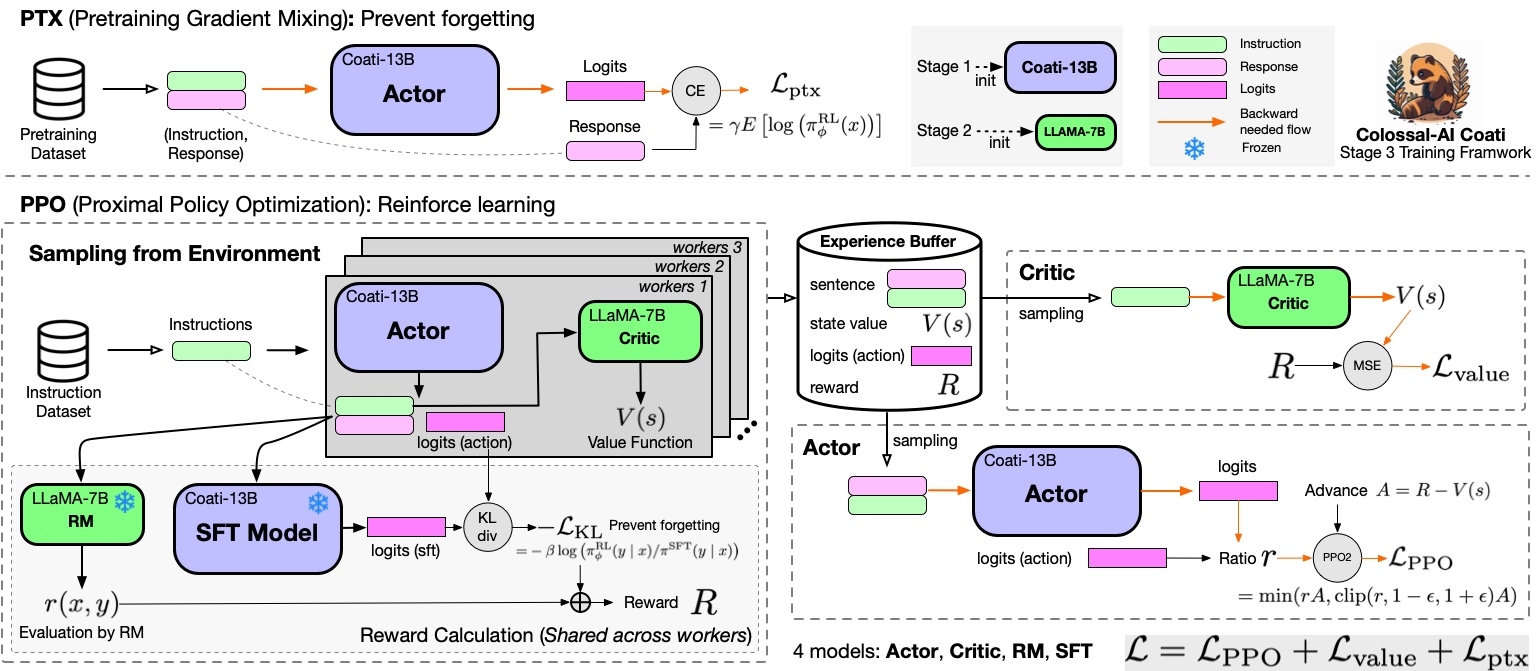* Add RoBERTa for RLHF Stage 2 & 3 (test) RoBERTa for RLHF Stage 2 & 3 (still in testing) * Revert "Add RoBERTa for RLHF Stage 2 & 3 (test)" This reverts commit |
||
|---|---|---|
| .. | ||
| README.md | ||
| inference.py | ||
| requirements.txt | ||
| test_ci.sh | ||
| train_dummy.py | ||
| train_dummy.sh | ||
| train_prompts.py | ||
| train_prompts.sh | ||
| train_reward_model.py | ||
| train_rm.sh | ||
| train_sft.py | ||
| train_sft.sh | ||
README.md
Examples
Install requirements
pip install -r requirements.txt
Supervised datasets collection
We colllected 104K bilingual dataset of Chinese and English, and you can find the datasets in this repo InstructionWild.
The following pic shows how we collected the data.

Stage1 - Supervised instructs tuning
Stage1 is supervised instructs fine-tuning, which uses the datasets mentioned earlier to fine-tune the model.
You can run the examples/train_sft.sh to start a supervised instructs fine-tuning.
You can also use the following cmd to start a supervised instructs fine-tuning with your own settings.
torchrun --standalone --nproc_per_node=4 train_sft.py \
--pretrain "/path/to/LLaMa-7B/" \
--model 'llama' \
--strategy colossalai_zero2 \
--log_interval 10 \
--save_path /path/to/Coati-7B \
--dataset /path/to/data.json \
--batch_size 4 \
--accimulation_steps 8 \
--lr 2e-5 \
--max_datasets_size 512 \
--max_epochs 1 \
Arg List
- --strategy: the strategy using for training, choices=['naive', 'ddp', 'colossalai_gemini', 'colossalai_zero2'], default='naive'
- --model: model type, choices=['gpt2', 'bloom', 'opt', 'llama'], default='bloom'
- --pretrain: pretrain model, type=str, default=None
- --max_datasets_size: the max size of dataset, type=int, default=None
- --save_path: path to save the model, type=str, default='output'
- --need_optim_ckpt: whether to save optim ckpt, type=bool, default=False
- --max_epochs: max epochs for training, type=int, default=3
- --batch_size: batch size while training, type=int, default=4
- --lora_rank: low-rank adaptation matrices rank, type=int, default=0
- --log_interval: how many steps to log, type=int, default=100
Stage2 - Training reward model
We train a reward model in stage 2, which obtains corresponding scores by manually ranking different outputs for the same prompt and supervises the training of the reward model.
You can run the examples/train_rm.sh to start a reward model training.
You can also use the following cmd to start training a reward model.
torchrun --standalone --nproc_per_node=4 train_reward_model.py
--pretrain "/path/to/LLaMa-7B/" \
--model 'llama' \
--strategy colossalai_zero2 \
--loss_fn 'log_exp'\
--save_path 'rmstatic.pt' \
Features and tricks in RM training
- We support Anthropic/hh-rlhfandrm-static datasets.
- We support 2 kinds of loss_function named 'log_sig'(used by OpenAI) and 'log_exp'(used by Anthropic).
- We change the loss to valid_acc and pair_dist to monitor progress during training.
- We add special token to the end of the sequence to get better result.
- We use cosine-reducing lr-scheduler for RM training.
- We set value_head as 1 liner layer and initialize the weight of value_head using N(0,1/(d_model + 1)) distribution.
- We train a Bloom-560m reward model for 1 epoch and find the test acc of the model achieve the performance mentions in Anthropics paper.
Experiment result
Model performance in Anthropics paper:


Arg List
- --strategy: the strategy using for training, choices=['naive', 'ddp', 'colossalai_gemini', 'colossalai_zero2'], default='naive'
- --model: model type, choices=['gpt2', 'bloom', 'opt', 'llama'], default='bloom'
- --pretrain: pretrain model, type=str, default=None
- --model_path: the path of rm model(if continue to train), type=str, default=None
- --save_path: path to save the model, type=str, default='output'
- --need_optim_ckpt: whether to save optim ckpt, type=bool, default=False
- --max_epochs: max epochs for training, type=int, default=3
- --dataset: dataset name, type=str, choices=['Anthropic/hh-rlhf', 'Dahoas/rm-static']
- --subset: subset of the dataset, type=str, default=None
- --batch_size: batch size while training, type=int, default=4
- --lora_rank: low-rank adaptation matrices rank, type=int, default=0
- --loss_func: which kind of loss function, choices=['log_sig', 'log_exp']
- --max_len: max sentence length for generation, type=int, default=512
- --test: whether is only tesing, if it's ture, the dataset will be small
Stage3 - Training model using prompts with RL
Stage3 uses reinforcement learning algorithm, which is the most complex part of the training process, as shown below:

You can run the examples/train_prompts.sh to start PPO training.
You can also use the cmd following to start PPO training.
torchrun --standalone --nproc_per_node=4 train_prompts.py \
--pretrain "/path/to/LLaMa-7B/" \
--model 'llama' \
--strategy colossalai_zero2 \
--prompt_path /path/to/your/prompt_dataset \
--pretrain_dataset /path/to/your/pretrain_dataset \
--rm_pretrain /your/pretrain/rm/defination \
--rm_path /your/rm/model/path
Arg List
- --strategy: the strategy using for training, choices=['naive', 'ddp', 'colossalai_gemini', 'colossalai_zero2'], default='naive'
- --model: model type of actor, choices=['gpt2', 'bloom', 'opt', 'llama'], default='bloom'
- --pretrain: pretrain model, type=str, default=None
- --rm_model: reward model type, type=str, choices=['gpt2', 'bloom', 'opt', 'llama'], default=None
- --rm_pretrain: pretrain model for reward model, type=str, default=None
- --rm_path: the path of rm model, type=str, default=None
- --save_path: path to save the model, type=str, default='output'
- --prompt_path: path of the prompt dataset, type=str, default=None
- --pretrain_dataset: path of the ptx dataset, type=str, default=None
- --need_optim_ckpt: whether to save optim ckpt, type=bool, default=False
- --num_episodes: num of episodes for training, type=int, default=10
- --max_epochs: max epochs for training in one episode, type=int, default=5
- --max_timesteps: max episodes in one batch, type=int, default=10
- --update_timesteps: timesteps to update, type=int, default=10
- --train_batch_size: batch size while training, type=int, default=8
- --ptx_batch_size: batch size to compute ptx loss, type=int, default=1
- --experience_batch_size: batch size to make experience, type=int, default=8
- --lora_rank: low-rank adaptation matrices rank, type=int, default=0
- --kl_coef: kl_coef using for computing reward, type=float, default=0.1
- --ptx_coef: ptx_coef using for computing policy loss, type=float, default=0.9
Inference example - After Stage3
We support different inference options, including int8 and int4 quantization.
For details, see inference/.
Attention
The examples are demos for the whole training process.You need to change the hyper-parameters to reach great performance.
data
- rm-static
- hh-rlhf
- openai/summarize_from_feedback
- openai/webgpt_comparisons
- Dahoas/instruct-synthetic-prompt-responses
Support Model
GPT
- GPT2-S (s)
- GPT2-M (m)
- GPT2-L (l)
- GPT2-XL (xl)
- GPT2-4B (4b)
- GPT2-6B (6b)
BLOOM
OPT
LLaMA
- LLaMA-7B
- LLaMA-13B
- LLaMA-33B
- LLaMA-65B